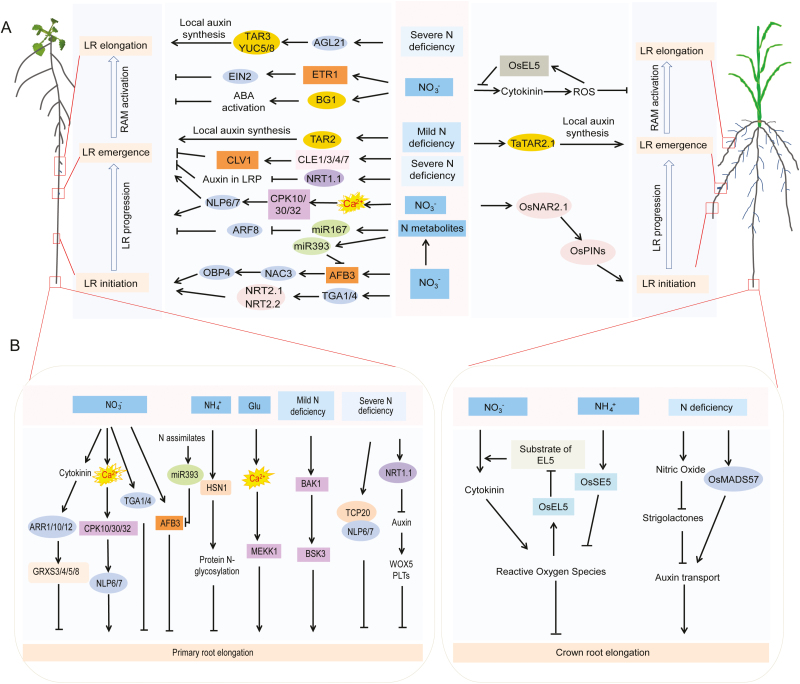Fig. 2.
Signaling pathways shaping lateral root or primary root development in response to N deficiency or N supply in Arabidopsis and graminaceous species. (A) Signaling pathways involved in N-dependent lateral root (LR) formation in Arabidopsis and graminaceous species. Nitrate modulates LR growth in almost all developmental phases. Nitrate controls LR initiation through transcription factors TGA1/4 and the miR393/AFB3–NAC3–OBP4 signaling cascade. It also employs the miR167/ARF8 module and Ca2+–CPK10/30/32–NLP6/7 signaling to modulate LR progression/emergence. After the emergence, nitrate controls LR elongation through ETR1–EIN2-dependent ethylene and BG1-dependent ABA signalling pathways. In rice, OsNAR2.1 modulates polar auxin transport to control LR initiation, and OsEL5 interacts with NO3–-dependent cytokinin signaling to regulate LR elongation. Regarding N deficiency, severe N deficiency prevents LR emergence through the CLE/CLV1 peptide signaling module and NRT1.1-modulated auxin removal from LR primodia (LRP). It also positively regulates the MADS-box transcription factor AGL21 to regulate LR elongation, possibly through regulating local auxin biosynthesis. Mild N deficiency stimulates TAR2-dependent local auxin biosynthesis in the vasculature and pericycle to promote LR emergence, which is a rather conserved signaling cascade also discovered in wheat. (B) Signaling pathways shaping primary root development in Arabidopsis and graminaceous species under varying N availabilities. In addition to their roles in LR growth, transcription factors TGA1/4, miR393/AFB3, and Ca2+–CPK10/30/32–NLP6/7 signaling in Arabidopsis and OsEL5 in rice modulate primary root growth under nitrate supply. Nitrate also suppresses primary root elongation through glutaredoxins (GRXS3/4/5/8) acting downstream of cytokinin signaling. The inhibitory effect of ammonium on primary root elongation depends on HSN1-mediated protein N-glycosylation in Arabidopsis and production of ROS. In rice, OsSE5 can counteract the inhibition of ammonium by ROS detoxification. Glutamate (l-Glu) inhibits primary root elongation via the signaling kinase MEKK1. Severe N deficiency regulates root meristem size and distal stem cell differentiation, which involves TCP20–NLP6/7 and NRT1.1–auxin–WOX5/PLTs signaling pathways. In Arabidopsis, mild N deficiency enhances brassinosteroid signaling mediated by BAK1 and BSK3 to stimulate primary root elongation. In parallel, low N promotes crown root elongation in rice, which depends on polar auxin transport tuned by the intricate interaction of nitric oxide, strigolactones, and OsMADS57. ROS, reactive oxygen species; RAM, root apical meristem.

